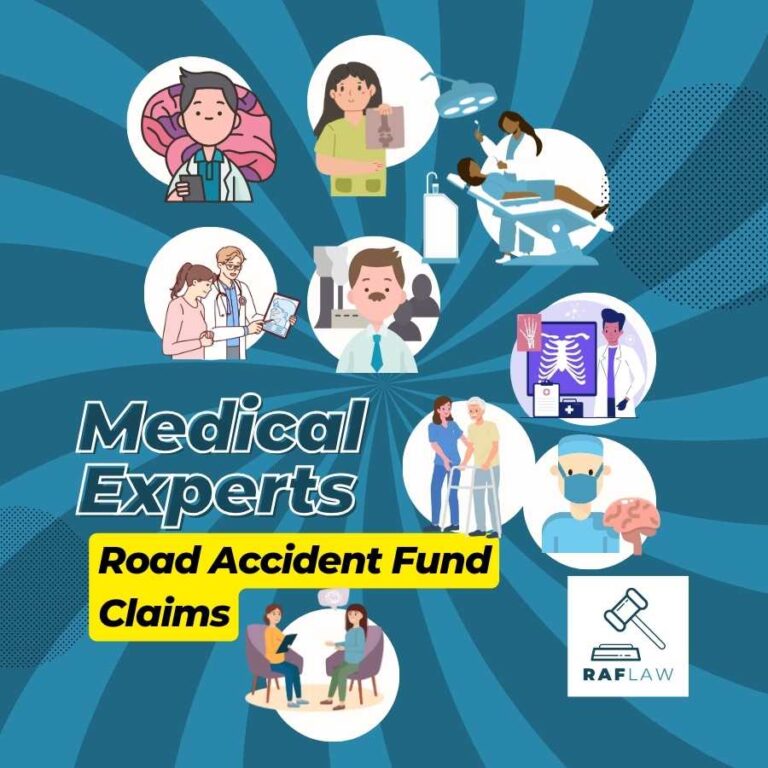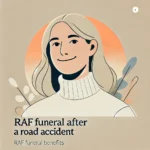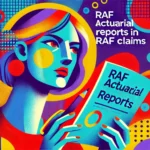🚑 Journey through the intricate world of RAF claims with our in-depth exploration of the indispensable roles played by medical experts.
From the precise assessments of orthopedic surgeons to the insightful evaluations of neurologists. Each professional brings a unique perspective that profoundly impacts the outcomes of these claims.
In this article we discover how the expertise of 6 medical professionals shapes the path to recovery and fair compensation for accident victims.
✅ Orthopedic Surgeons
✅ Neurologists
✅ Occupational Therapists
✅ Industrial Psychologists
✅ Radiologists
✅ Maxillofacial and Oral Surgeons
Dive into our comprehensive guide for a holistic understanding of how these medical maestros influence RAF claims in South Africa.
1. Orthopedic Surgeons: The Backbone of Assessing Physical Trauma in RAF Claims
Orthopedic surgeons hold a pivotal role in the realm of Road Accident Fund (RAF) claims in South Africa.
They specialize in diagnosing and treating injuries related to the musculoskeletal system., Their expertise is crucial in determining the extent and impact of physical injuries sustained in road accidents.

The Expert Role of Orthopedic Surgeons in RAF Claims
Diagnosing and Assessing Injury Severity
Orthopedic surgeons are tasked with a critical responsibility. They must assess the extent of bone and joint injuries.
Their evaluations provide essential insights into
- how severe the injuries are,
- the potential for long-term disability, and
- the necessary rehabilitation or surgical interventions required.
Prognosis and Future Implications
They not only diagnose the present condition but also provide a prognosis on future implications.
This includes assessing the likelihood of future surgeries, potential arthritis development, and long-term pain management.
Case Studies: The Impact of Orthopedic Assessment in RAF Claims
These case studies demonstrate how specialist orthopedic medical reports drove the outcome of RAF claims.
Case Study 1: A Complex Fracture Scenario
- Background: A victim involved in a severe car accident presented with multiple fractures.
- Orthopedic Surgeon’s Involvement: Detailed assessment of fracture types, surgical requirements, and the rehabilitation process.
- Outcome: The surgeon’s report was instrumental in securing a comprehensive compensation package. This covered not just immediate medical costs, but also long-term rehabilitation and loss of income.
Case Study 2: Spinal Injury Assessment
- Background: A road accident resulted in a spinal injury, leading to partial paralysis.
- Orthopedic Surgeon’s Involvement: Evaluation of spinal damage, prognosis, and recommendation for specialized treatments.
- Outcome: The expert testimony and report played a key role in the claimant receiving a settlement that catered to the lifelong care and modifications needed for their new lifestyle.
Collaborating with Legal Teams for Comprehensive Claims
Bridging Medical Assessment and Legal Representation
Orthopedic surgeons collaborate closely with legal teams.
Their medical reports and testimony provide a bridge between the medical assessment and the legal representation. This ensures that the claim accurately reflects the injury’s impact.
The Importance of Detailed Medical Evidence
In RAF claims, the orthopedic surgeon’s detailed medical evidence is vital.
It helps in quantifying the claim, factoring in not just immediate medical expenses, but also the cost of future care, potential earnings loss, and the impact on the claimant’s quality of life.
2. Neurologists: Deciphering the Impact of Brain and Nerve Injuries in RAF Claims
In the intricate landscape of Road Accident Fund (RAF) claims in South Africa, neurologists play an essential role.
Their expertise in understanding and diagnosing neurological injuries is crucial for claimants who have suffered traumatic brain injuries, spinal cord damages, or nerve-related impairments due to road accidents.

The Critical Role of Neurologists in Assessing Neurological Damage
Evaluating the Extent of Neurological Injuries
Neurologists specialize in disorders of the nervous system, which includes the brain, spinal cord, and nerves.
In the context of RAF claims, they assess the severity of neurological injuries and their implications. These are often not immediately apparent.
Prognosis and Long-Term Impact Analysis
Beyond immediate injury assessment, neurologists also provide a prognosis of these injuries.
This includes potential long-term effects like cognitive impairments, sensory losses, or motor function disabilities. All are crucial for determining the appropriate compensation.
Case Studies: Neurological Assessments Influencing RAF Claims
These case studies demonstrate how specialist neurological expert reports drove the outcome of real claims.
Case Study 1: Traumatic Brain Injury (TBI) Assessment
- Background: A victim involved in a road collision suffered a TBI.
- Neurologist’s Involvement: Comprehensive evaluation of the brain injury, including cognitive and motor function tests.
- Outcome: The neurologist’s detailed report on the extent of the injury and its long-term implications significantly influenced the compensation awarded. This ensured coverage for ongoing medical care and loss of income.
Case Study 2: Addressing Spinal Cord Injuries
- Background: An accident resulted in severe spinal cord damage for the claimant, leading to paralysis.
- Neurologist’s Involvement: Assessment of the spinal injury severity, prognosis, and recommendations for rehabilitation and assistive devices.
- Outcome: The neurologist’s testimony provided a strong basis for a claim that encompassed not only medical costs. But it also adaptations for the claimant’s altered lifestyle and potential future medical needs.
Bridging Medical Expertise with Legal Needs in RAF Claims
Vital Collaboration with Legal Teams
The collaboration between neurologists and legal teams is vital in RAF claims.
The medical evidence provided by neurologists forms a foundational part of the claim. It does so by bridging the gap between medical diagnosis and legal compensation.
The Importance of Accurate Neurological Reporting
In RAF claims, accurate and comprehensive reporting by neurologists is essential.
It ensures that the full impact of neurological injuries is recognized and compensated accordingly. Neurologists take into account both current needs and future challenges.
3. Occupational Therapists: Enhancing Life After Road Accidents Through RAF Claims
Occupational therapists play a pivotal role in the Road Accident Fund (RAF) claims process in South Africa.
Their unique focus on improving the daily lives of accident victims. This makes them indispensable in determining the extent of compensation required for a comprehensive recovery.

Integral Role of Occupational Therapists (OT) in RAF Claims
Assessing Functional Impact
Occupational therapists (OT) specialize in evaluating how injuries affect a person’s ability to perform everyday tasks.
They assess the functional impact of injuries, ranging from basic self-care to more complex occupational duties. They critically provide a holistic view of the victim’s needs post-accident.
Rehabilitation and Recovery Planning
They are instrumental in planning and implementing rehabilitation strategies tailored to the individual’s needs.
This includes recommending
- assistive devices,
- modifications to living or working environments, and
- therapeutic interventions.
Real-Life Cases: The Difference Made by Occupational Therapy
These case studies demonstrate how specialist OT expert reports drove real RAF claims in South Africa.
Case Study 1: Restoring Independence
- Background: A road accident victim faced challenges in performing daily activities due to a combination of physical and cognitive injuries.
- Occupational Therapist’s Role: Conducted a thorough assessment and created a personalized rehabilitation plan, focusing on regaining independence.
- Outcome: The therapist’s report was crucial in the RAF claim, securing funds for ongoing therapy, home modifications, and specialized equipment.
Case Study 2: Returning to Work
- Background: An individual suffered injuries that hindered their ability to return to their professional role.
- Occupational Therapist’s Role: Evaluated the impact of the injuries on their job performance and recommended job retraining and workplace adaptations.
- Outcome: The detailed assessment and recommendations played a significant role in the RAF claim. This led to compensation that covered job retraining and adaptations needed for a successful return to work.
Bridging Medical Recovery with Practical Life Adaptations
Collaborative Approach with Legal Teams
OTs work closely with legal teams in RAF claims. Their reports provide a comprehensive picture of the victim’s post-accident needs, ensuring that the legal claim encompasses all aspects of their recovery journey.
Importance of Holistic Assessment
The holistic assessment provided by occupational therapists in RAF claims is critical. It ensures that the claim not only addresses immediate medical costs but also encompasses the broader scope of the victim’s life changes, including long-term care, adaptations, and therapy needs.
4. Industrial Psychologists: Unraveling the Psychological Impact in RAF Claims
In the landscape of Road Accident Fund (RAF) claims in South Africa, the role of industrial psychologists is often pivotal yet overlooked.
These professionals delve into the psychological aftermath of road accidents, assessing how injuries impact the mental health and occupational capabilities of victims.

The Crucial Role of Industrial Psychologists in RAF Claims
Evaluating Psychological and Occupational Impacts
Industrial psychologists focus on the mental health consequences of road accidents. Sadly, this includes
- trauma,
- anxiety,
- depression, and
- Post-Traumatic Stress Disorder (PTSD).
They assess how these conditions affect a victim’s ability to return to work and their overall occupational functionality.
Assessing Return to Work and Career Adaptation
They play a key role in determining the feasibility of a victim’s return to their previous job. If not, they can assess the need for career adaptation or retraining, considering the psychological impact of the injuries sustained.
Case Studies: The Impact of Industrial Psychology in RAF Claims
These case studies demonstrate how specialist IP expert reports drove the claimant outcomes in court.
Case Study 1: Overcoming Post-Accident Trauma
- Background: A professional suffered from PTSD following a severe road accident, impacting their work performance.
- Industrial Psychologist’s Role: Conducted an in-depth assessment of the psychological impact and provided recommendations for therapy and gradual return to work.
- Outcome: The psychologist’s report was instrumental in the RAF claim, ensuring compensation for therapy and support during the transition back to work.
Case Study 2: Career Transition After an Accident
- Background: An accident left a victim with cognitive impairments, making it impossible to continue in their current profession.
- Industrial Psychologist’s Role: Evaluated the victim’s abilities and potential for retraining in a different career suited to their new capabilities.
- Outcome: The detailed report contributed to a claim that included compensation for retraining and support during the career transition.
Enhancing RAF Claims Through Psychological Insight
Integral Collaboration with Legal Teams
Industrial psychologists work in tandem with legal teams. They provide insights into the less visible, yet significant, psychological impacts of road accidents.
Their reports are critical for developing a comprehensive claim that addresses both physical and mental health needs.
The Significance of Comprehensive Psychological Assessment
The comprehensive assessment provided by industrial psychologists ensures that RAF claims accurately reflect the full spectrum of the victim’s needs.
This includes not only immediate medical costs but also long-term mental health care, occupational therapy, and potentially career transition support.
5. Radiologists: The Invisible Lens in Road Accident Fund Claims
Radiologists play a crucial, albeit often unseen, role in the Road Accident Fund (RAF) claims process in South Africa.
Their expertise in medical imaging provides invaluable evidence in substantiating the extent of injuries sustained in road accidents.

The Essential Role of Radiologists in Assessing Injury Severity
Providing Clarity Through Imaging
Radiologists specialize in interpreting medical images such as X-rays, CT scans, and MRIs.
These images are vital in revealing the internal impact of road accidents, offering objective evidence of injuries like fractures, internal bleeding, and organ damage.
Impact on Claim Validity and Assessment
The detailed reports provided by radiologists are key in establishing the validity of a claim. They provide a clear picture of the injury severity, which is crucial for determining appropriate compensation.
Case Studies: Radiologist Reports Influencing RAF Claims
These case studies show how specialist expert reports from South African radiologists helped drive the claimant outcomes in RAF settlements.
Case Study 1: Complex Fracture Identification
- Background: A victim suffered multiple injuries in a car accident, with some fractures not immediately apparent.
- Radiologist’s Role: Utilized advanced imaging techniques to identify and document all fractures and internal injuries.
- Outcome: The radiologist’s comprehensive report provided essential evidence in the RAF claim, leading to a settlement that covered extensive medical treatments and rehabilitation.
Case Study 2: Hidden Injury Revelation
- Background: A road accident victim complained of persistent pain despite initial assessments showing minimal injury.
- Radiologist’s Role: Conducted in-depth imaging studies that revealed subtle yet significant internal injuries previously undetected.
- Outcome: The findings significantly altered the course of the RAF claim, ensuring the victim received compensation commensurate with the actual extent of their injuries.
The Critical Nature of Radiological Evidence in RAF Claims
Bridging Medical Insight with Legal Requirements
Radiologists bridge the gap between medical insight and legal requirements. Their objective reports translate complex medical data into understandable evidence, crucial for the legal process.
The Importance of Accurate and Detailed Imaging Reports
In RAF claims, the accuracy and detail of radiological reports are paramount. They ensure that every aspect of the victim’s injuries is recognized and factored into the claim, leading to a fair and comprehensive compensation package.
6. Maxillofacial and Oral Surgeons: Restoring Lives in RAF Claims
In the realm of Road Accident Fund (RAF) claims in South Africa, the expertise of maxillofacial and oral surgeons plays a critical role.
These specialists are key in addressing complex facial and dental injuries sustained in road accidents. This ensures that victims receive the compensation necessary for their comprehensive recovery.

Pivotal Role of Maxillofacial and Oral Surgeons in RAF Claims
Expertise in Facial Trauma
Maxillofacial and oral surgeons specialize in injuries related to the face, mouth, jaws, and neck.
Their role in RAF claims is to assess the extent of these injuries.
These can range from dental damage to complex facial fractures and disfigurements.
Crafting a Path to Recovery
Beyond assessing injury, these surgeons also outline the necessary surgical interventions and rehabilitation processes.
Their treatment plans often involve
- reconstructive surgery,
- dental restoration, and
- long-term rehabilitation strategies.
Case Studies: Impactful Contributions in RAF Claims
These case studies demonstrate how specialist dental expert reports drove the claimant outcomes in real road accident claims.
Case Study 1: Complex Facial Reconstruction
- Background: A severe road accident left a victim with multiple facial fractures and disfigurements.
- Surgeon’s Role: Performed detailed assessments, conducted reconstructive surgeries, and planned ongoing rehabilitation.
- Outcome: The surgeon’s comprehensive report was instrumental in securing a claim that covered all surgical and rehabilitation costs, significantly aiding the victim’s recovery journey.
Case Study 2: Dental Restoration Post-Accident
- Background: An accident victim suffered significant dental injuries, impacting their ability to eat and speak properly.
- Surgeon’s Role: Assessed the dental damage and performed multiple restorative procedures.
- Outcome: The detailed treatment plan and prognosis provided by the surgeon ensured that the RAF claim included comprehensive compensation for all dental work. This was critical for restoring the victim’s functionality and quality of life.
The Integral Nature of Maxillofacial and Oral Surgery in RAF Claims
Bridging Medical Treatment with Legal Compensation
Maxillofacial and oral surgeons bridge the gap between intricate medical treatment and legal compensation.
Their reports and testimonies play a vital role in ensuring that the physical and psychological impacts of facial injuries are fully recognized and compensated in RAF claims.
Emphasizing the Need for Comprehensive Care
The detailed assessments and treatment plans provided by these surgeons emphasize the need for comprehensive care in RAF claims.
They ensure that the victim’s recovery journey, from acute care to long-term rehabilitation, is thoroughly considered in the compensation package.
Conclusion
As we have navigated the diverse roles of medical experts in RAF claims, it becomes evident how each specialist.
From orthopedic surgeons to maxillofacial and oral surgeons, contributes significantly to the journey of recovery and justice for accident victims.
Their expertise not only aids in accurate injury assessment but also ensures that the psychological and occupational impacts are duly considered.
This comprehensive insight underscores the necessity of expert involvement for fair and just compensation in RAF claims.
Do you know someone navigating the complexities of an RAF claim?
Remember that understanding and leveraging the expertise of these medical professionals can make all the difference.
Join the RAF Fact newsletter today, where we provide expert guidance and support to help you through every step of your claim process.
Together, let’s ensure your road to recovery is supported by the best in medical and legal expertise.
Connect with RAF Fact now and take the first step towards a successful claim resolution.
Frequently Asked Questions
What role do orthopedic surgeons play in RAF claims?
Orthopedic surgeons assess bone and joint injuries from road accidents, determining the severity and long-term impact for RAF claims.
How do neurologists contribute to RAF claims?
Neurologists evaluate brain and nerve injuries, providing insights into long-term effects like cognitive impairment and paralysis in RAF claims.
What is the importance of occupational therapists in RAF claims?
Occupational therapists assess how injuries impact daily activities and work life, planning rehabilitation for a comprehensive RAF claim.
How do industrial psychologists affect RAF claims?
Industrial psychologists evaluate the psychological impact of accidents, like trauma and PTSD, influencing career-related aspects of RAF claims.
What is the role of radiologists in RAF claims?
Radiologists use imaging techniques to reveal internal injuries, providing objective evidence crucial for validating RAF claims.
How do maxillofacial and oral surgeons impact RAF claims?
They assess and treat facial and dental injuries, ensuring RAF claims cover necessary surgeries and long-term rehabilitation.
Why is detailed medical evidence important in RAF claims?
Detailed medical evidence ensures all aspects of an injury are recognized, leading to fair and comprehensive compensation in RAF claims.
Can medical experts influence the outcome of RAF claims?
Yes, their expertise and reports are crucial in determining the extent of injuries and appropriate compensation in RAF claims.
What kind of injuries do these medical experts assess in RAF claims?
They assess a range of injuries including bone fractures, brain injuries, psychological trauma, and facial or dental damage.
Should I consult these medical experts for my RAF claim?
Consulting these experts can provide accurate assessments of your injuries, which is essential for a successful RAF claim.






One Response
Good Day
2yrs ago i had a vehicle ankle injury accident for RAF valuation form which i paid for in the Hospita its now 6 weeks I’m waiting to be booked for a Orhopadic Specialist after submitting the RAF 4 form so i need a Specialist of my choice as I’ve been waiting too long without any way foward or communication as promised